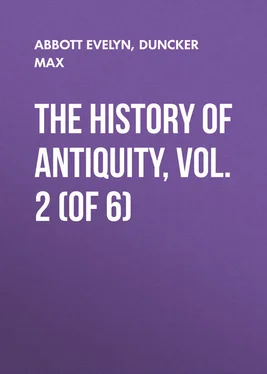Diod. 4, 2, 60; 5, 56, 57, 58, 48, 49.
Ephor. Frag. 12, ed. Müller.
Herod. 4, 147; 2, 45, 49; 5, 58, 59.
Frag. 8, 9, ed. Müller.
Frag. 40-42, 43-45, ed. Müller.
Frag. 163, ed. Müller.
"Theog." 937, 975; Pind. "Pyth." 3, 88 seqq.
Movers, "Phœniz." 1, 129, 131.
Plut. "Pelop." c. 19.
Pind. "Olymp." 2, 141.
Vol. i. 271.
Movers, "Phœniz." 1, 517.
Thac. 1, 8.
Vol. i. 363, 364.
Athenæus, p. 360.
Diod. 5, 58.
Bœckh. C. I. G. 2526.
Hefter, "Götterdienste auf Rhodos," 3, 18; Welcker, "Mythologie," 1, 145; Brandis, "Munzwesen," s. 587.
Schol. Pind. "Pyth." 4, 88; Pausan. 3, 1, 7, 8; Steph. Byz. Μεμβλίαρος.
Bœckh. C. I. G. 2448.
Herod. 4, 147; Steph. Byz. Μῆλος.
Steph. Byz. Ὠλίαρος.
Strabo, pp. 346, 457, 472; Diod. 5, 47.
Vol. i. 378; Herod. 2, 51; Conze, "Inseln des Thrakischen Meeres," e. g. s. 91.
Strabo, p. 473; Steph. Byz. Ἴμβρος; vol. i. 378.
Herod. 2, 44; 6, 47.
Herod. 1, 105; Pausan. 1, 14, 7; 3, 23, 1.
Pausan. 10, 11, 5; Bœckh, "Metrologie," s. 45.
Pausan. 1, 2, 5; 1, 14, 6, 7.
Strabo, p. 377; Pausan. 1, 32, 5.
ΑΘΗΝΑΙΟΝ ς´ γ´, 1877, and below, chap. xi.
Brandis, "Hermes," 2, 275 ff. I cannot agree in all points with the deductions of this extremely acute inquiry.
"Il." 14, 321; 18, 593; "Odyss." 19, 178; 11, 568.
"Odyss." 11, 523.
Diod. 4, 60.
Serv. ad "Æneid." 6, 30.
Hesych. ἐπ᾿ Εὐρυγύν ἀγών; Plut. "Thes." c. 15; Diod. 4, 65.
Apollodor. 1, 9, 26; Suidas, Σαρδώνιος γέλως.
Herod. 7, 110.
Diod. 4, 76-78; Schol. Callim. "Hymn. in Jovem," 8.
Istri frag. 47, ed. Müller.
Istri frag. 33, ed. Müller.
Müllenhoff, "Deutsche Alterthumskunde," i. 222.
Plato, "Minos," pp. 262, 266, 319, 321; "De. Legg," init. ; Aristot. "Pol." 2, 8, 1, 2; 7, 9, 2.
Herod. 1, 171; 3, 122; 7, 169-171.
Herod. 1, 4.
Herod. 3, 122.
Strabo, p. 476; Steph. Byz. Ἰτανός.
Pausan. 3, 21, 6.
Aristotle, in Steph. Byz. Κύθηρα.
Above, p. 63.
Strabo, p. 479.
Below, chap. 11.
Thuc. 1, 8.
Herod. 7, 171.
Herod. 2, 44, 145.
Herod. 4, 147.
Thuc. 5, 112.
Herod. 5, 89; "Il." 13, 451; "Odyss." 19, 178.
Euseb. "Chron." 2, p. 34 seqq. ed. Schöne. Even in Diodorus, 4, 60, we find two Minoses, an older and a younger.
Lenormant, "Antiq. de la Troade," p. 32.
Genesis x. 2-4: 1 Chron. i. 5-7.
Kiepert, "Monatsberichte Berl. Akad." 1859.
Ezek. xxvii. 7.
Thuc. vi. 2.
Diod. v. 12.
Ptolem. 4, 3, 47.
Ai benim ; Movers, "Phœniz." 2, 355, 359, 362.
Heracl. Pont. frag. 29, ed. Müller; Gesen. "Monum." p. 293; Olshausen, "Rh. Mus." 1852, S. 328.
Thuc. 6, 2.
Diod. 4, 83.
"Æn." 5, 760.
Diod. 4, 83; Strabo, p. 272; Athenæus, p. 374; Aelian, "Hist. An." 4, 2; 10, 50.
Diod. 4, 23.
Herod. 5, 43.
Steph. Byz. Σολοῦς. Sapphon. frag. 6, ed. Bergk; it is possible that Panormus on Crete may be meant.
Thuc. 6, 2.
Diod. 5, 35.
Diod. 4, 24, 29, 30; 5, 15; Arist. "De mirab. ausc." c. 104; Pausan. 10, 17, 2.
Movers ("Phœniz." 1, 536) assumes that Iolaus may be identical with Esmun (I. 377).
Sallust, "Jugurtha," 19, 1.
Movers, loc. cit. s. 144.
"De mirab. ausc." c. 146.
"Hist. nat." 16, 79.
Arkal or Archal may mean "fire of the All," "light of the All."
Etym. Magn. Γαδεῖρα.
Diod. 5, 19, 20.
On the meaning given in Avienus ("Ora marit") of Abila as "high mountain," and Calpa as "big-bellied jar," cf. Müllenhoff, "Deutsche Alterthumsk," 1, 83.
Strabo, pp. 169-172. Justin (44, 5) represents the Tyrians as founding Gades in consequence of a dream. In regard to the name cf. Avien. "Ora marit," 267-270.
Movers, "Phœniz." 2, 622. Strabo (p. 48) puts the first settlements of the Phenicians in the midst of the Libyan coast and at Gades just after the Trojan war, Velleius (1, 2, 6, in combination with 1, 8, 4), in the year 1100 B.C. Cf. Movers, loc. cit. S. 148, note 90. The Greeks called both land and river Tartessus. The pillars of the Tyrian god "Archaleus," are with them the pillars of their "Heracles," which he sets up as marks of his campaigns. Here, opposite the mouth of the Tartessus, they place the island Erythea, i. e. the red island on which the giant Geryon, i. e. "the roarer," guards the red oxen of the sun: Erythea is one of the islands near Cadiz; Müllenhoff, Deutsche "Alterthumsk: " 1, 134 ff.
Sall. "Jugurtha," c. 19.
Читать дальше












